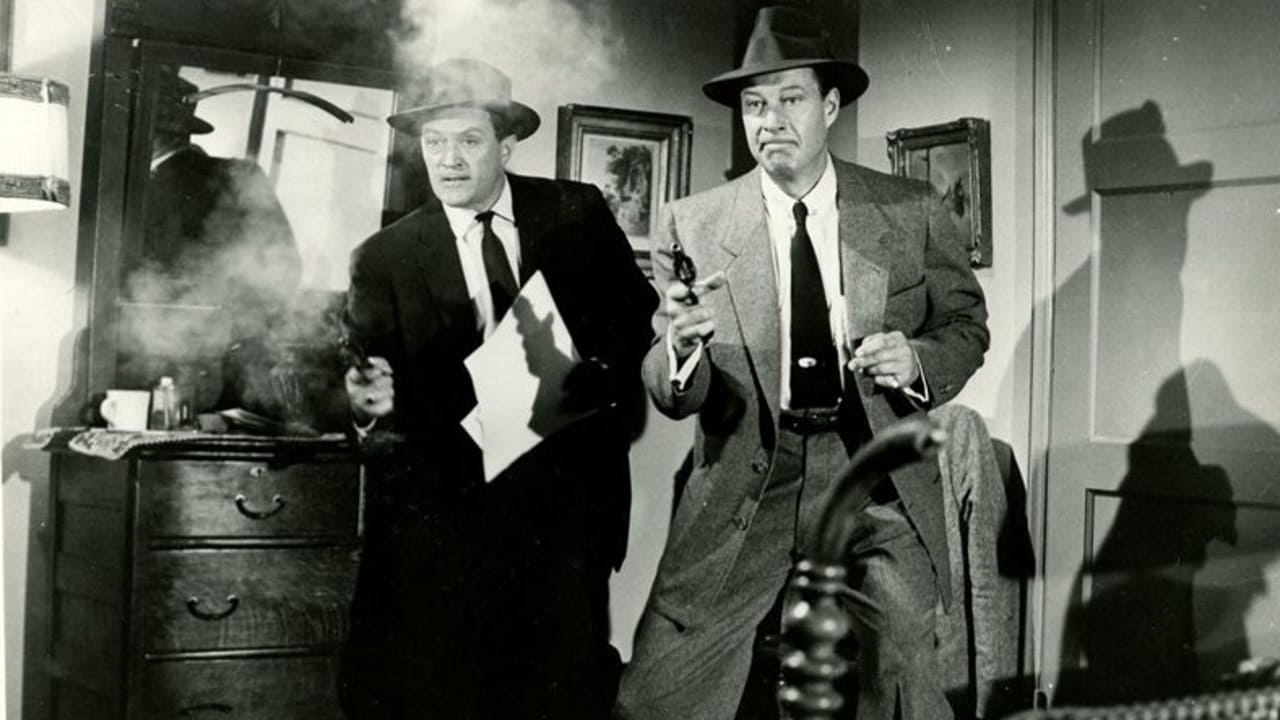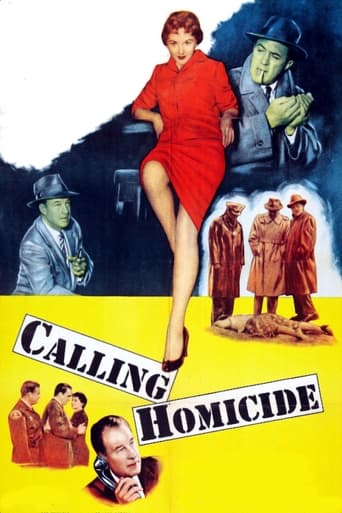Claysaba
Excellent, Without a doubt!!
KnotStronger
This is a must-see and one of the best documentaries - and films - of this year.
Billie Morin
This movie feels like it was made purely to piss off people who want good shows
Celia
A great movie, one of the best of this year. There was a bit of confusion at one point in the plot, but nothing serious.
JohnHowardReid
Wild Bill Elliott (Lieutenant Doyle), Don Haggerty (Sergeant Duncan), Kathleen Case (Donna), Myron Healey (Maddox), Jeanne Cooper (Darlene), Thomas B. Henry (Gilmore), Lyle Talbot (Tony Fuller), Herb Vigran (Ray Engle), James Best.Director: EDWARD BERNDS. Original screenplay: Edward Bernds. Photography: Harry Neumann. Film editor: William Austin. Art director: David Milton. Construction supervisor: James West. Music: Marlin Skiles. Production manager: Allen K. Wood. Assistant director: Edward Morey, Jr. Sound recording: Ralph E. Butler. An Allied Artists Production.Copyright 1956 by Allied Artists. No New York opening. U.S. release: 30 September 1956. U.K. release through Associated British-Pathe, floating from August 1957. No Australian theatrical release. 5,480 feet. 61 minutes.SYNOPSIS: A school for models serves as a front for baby-selling and blackmail.COMMENT: A cheap Monogram mystery with absolutely no redeeming features. The cast boasts only one halfway decent actor, namely Lyle Talbot, and it's difficult to judge which of Bernds' contributions are the less proficient: his slow-paced screenplay or his equally torpid direction. Personally, I'd give the booby prize to the script. Even the identity of the murderer is glaringly obvious.Calling homicide? I'd like to call it something else!
mark.waltz
One thing was very clear to me while watching this movie, the third in a series of Hollywood set crime dramas with Bill Elliott as detective Andy Doyle. The set-up was basically a re-tread of the infamous black dahlia murder mystery, a real-life brutal slaying which has apparently never been resolved. In fact, that case is mentioned here, making it difficult to separate fact from fiction, just like every time Basil Rathbone as Sherlock Holmes declared, "This is the most notorious case to hit London ever since Jack the Ripper!".One thing is very clear as facts about the murdered woman are revealed. She was definitely very much hated. As her crusty housekeeper Almira Sessions declares, "I needed a job, and she needed somebody who could tolerate her!". I guess a paycheck is worth the price of working for somebody you despise, especially since Sessions obviously gave back as much as she had to take. It turns out that the murdered woman (only seen briefly lying face down in the mud) was a failed movie starlet who began a modeling agency which was the front for something more sinister.The list of suspects runs long which includes her business partners (among them Jeanne Cooper, the beloved matriarch of "The Young and the Restless") but it only scratches the surface of what is going on. Elliott gets on the case of a fellow colleague (murdered in a car explosion) who tells him of a racket he's investigating but doesn't give out any details. This takes the film into the realms of an exciting thriller that is definitely the epitome of what film noir is all about, not just another detective story. What seems like what could have been part of a late 1950's T.V. detective show is probably too violent in its subject matter and content to have been on the airwaves, making its film release much more plausible.
bmacv
An hour-long police procedural set in late-Chandler Los Angeles, Calling Homicide looks cheap and unstylish, like an episode of Perry Mason minus Raymond Burr, William Talman and Ray Collins (its cast is culled from from unsung bit-part players and brief-careered starlets, from veterans of crime programmers and Westerns – the lead goes to `Wild' Bill Elliott). But it has a Poverty-Row oomph to it and unfolds its story in a brisk, no-nonsense way.The L.A. Sheriff's Department gets hit by a doubled-barreled blast: One of its detectives is incinerated by a car bomb in the station's parking lot, while up in Coldwater Canyon a woman's body is discovered, mutilated like the Black Dahlia victim of a decade earlier. (The plot's roots stretch back to post-war Hollywood. A script girl identifies a photo as coming from Universal's The Crooked Mile; could she mean Republic's The Last Crooked Mile of 1946?) Galvanized into action, they identify the body as that of a former actress, now the ruthless proprietor of a `modeling' school – which turns out to be a cover for a black-market-baby (and blackmail) racket that the murdered detective had been investigating. There's no want of suspects, as they can't find anybody with a decent word to utter about the deceased. Still, nobody has the courage to sing; the few who consider it find themselves with very abbreviated futures....Far worse hours have been recorded on film than Calling Homicide, a stripped-down crime story that shows how closely related B-movies and television dramas had become in the late-1950s, though this Hollywood product shows a bit more edge and energy than would be thought suitable for living-room consumption for years to come.
django-19
CALLING HOMICIDE is one of the four police films in which former Western star "Wild Bill" Elliott played police detective Andy Doyle. These Allied Artists films were Elliott's last screen roles, and he certainly went out with a bang! The plot digs deep into the sordid underbelly of Hollywood in a way that Raymond Chandler would have been proud of (also reminiscent of such recent offerings as LA CONFIDENTIAL or TWILIGHT), but don't expect any Phillip Marlowe-esque flights of existential gutter-poetry-philosophy from Wild Bill Elliott, as he plays the role (and the role is written)in the stoic Gary Cooper vein. Like a good 1940s PRC mystery, this is a film where every supporting character is quirky and well-acted by such veterans as Lyle Talbot (wonderful as a drunk!), Myron Healey, James Best, and Mary Treen (who plays her role in the best Iris Adrian fashion). Interestingly, CALLING HOMICIDE was written and directed by Edward Bernds, veteran of many fine Three Stooges and Bowery Boys films. Bernds is a master of slapstick and comic timing, so it's a pleasant surprise to see him adapt so well to the hard-boiled crime genre. I'm going to check his filmography and track down any other crime dramas he may have written and/or directed. Good job, Mr. Bernds! The Andy Doyle police films were a nice swan song for Wild Bill Elliott--the western hero who best combined toughness with dignity. He was tough on the range, and he's just as tough on those mean streets of Los Angeles.

